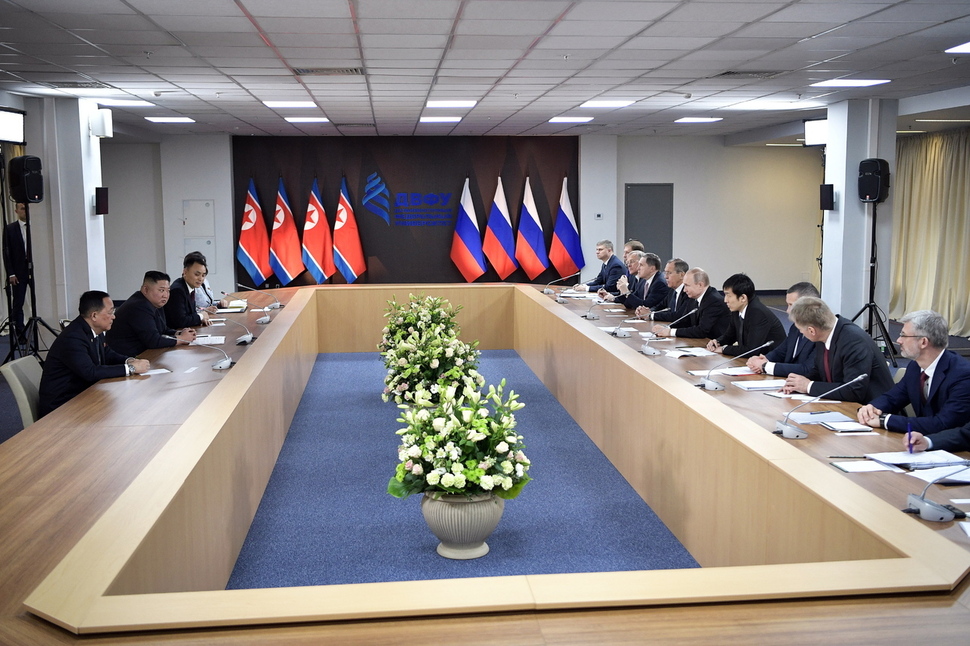 |
|
North Korean leader Kim Jong-un and Russian President Vladimir Putin during their summit in Vladivostok on Apr. 25. It is notable that Kim is accompanied only by Foreign Minister Ri Yong-ho and First Vice Minister of Foreign Affairs Choe Son-hui (TASS/Yonhap News)
|
Indicates hope of Russia playing proactive role on the North Korean nuclear issue
The primary item on the agenda of the first summit between North Korean leader Kim Jong-un and Russian President Vladimir Putin on Apr. 25 appears to have been the issue of the denuclearization of the Korean Peninsula, including the North Korea-US denuclearization talks, which are currently at an impasse, and sanctions on North Korea. Considering that this was the two countries’ first summit in eight years, it reportedly also included a wide-ranging discussion of economic cooperation. During a solo press conference held after the summit on Thursday, Putin said, “Chairman Kim and I spoke not only about our bilateral relations, the sanctions issue, and North Korea-US relations, but also about the primary agenda item of the denuclearization of the Korean Peninsula.” Putin related that North Korea and Russia had “similar positions” on denuclearization and reconfirmed that “North Korea wants denuclearization, too.” Putin made no specific mention of what he and Kim discussed in regard to the methodology of denuclearization. But he did emphasize the importance of “confidence building” and indirectly asked the US for “a commitment to constructive dialogue,” remarks that are consistent with a speech that Kim made after the rupture of the North Korea-US summit in Hanoi. These issues were likely deliberated in great depth during the expanded summit on Thursday, at which Kim was accompanied by Foreign Minister Ri Yong-ho and First Vice Minister of Foreign Affairs Choe Son-hui. Previously, Kim declared his intention to “jointly coordinate and study [the Korean Peninsula issue with Russia] in the future.” “The fact that Kim only brought along Ri Yong-ho and Choe Son-hui can be seen as a signal that he’s wholly focused on the denuclearization agenda,” said Hong Min, director of the North Korea research office at the Korea Institute for National Unification. By excluding economic and military officials from the meeting, Hong said, “Kim may also have been intending to send a message” to observers overseas. Putin also said he would discuss the results of the day’s summit with China and the US and that North Korea wanted him to do exactly that. The implication is that the two countries reached some kind of understanding in regard to Russia playing a proactive role on the North Korean nuclear issue in the future. It’s unclear what discussion took place in regard to easing the sanctions on North Korea, presumably something the North was keen to discuss. Putin said that there were deliberations about North Korean workers whom the UN Security Council has ordered to return home by the end of this year. “This is a matter connected with humanitarian issues and with the realization of their rights. I think there will be a solution that is calm and nonconfrontational,” Putin said, suggesting that North Korea and Russia may have found a solution on the issue of these workers. Putin urges S. Korea to get involved in joint projects Projects that Putin said were discussed include a link between the Trans-Korean Railway and the Trans-Siberian Railway; a natural gas pipeline connecting South Korea, North Korea and Russia; and power grid integration. Strikingly, Putin urged South Korea to join these projects, which he described as “corresponding to South Korea’s national interest.” Putin also indirectly acknowledged the limits faced by these projects under the sanctions regime on North Korea by remarking that South Korea seemed reluctant to move forward with them because of its status as a US ally. In addition to Deputy Prime Minister and Presidential Plenipotentiary Envoy to the Far Eastern Federal District Yury Trutnev and Russian Foreign Minister Sergey Lavrov, Russian officials at the extended summit on Thursday included the minister of transportation, the president of the railroad company, the minister of Far East development and the deputy minister of energy. The composition of the Russian contingent at the meeting suggests that Russia is prioritizing the development of the Far East and related trilateral cooperation with South and North Korea. “Russia is a country whose commercial interests could be greatly expanded if North Korea denuclearizes. In that sense, Russia appears to have reaffirmed the overarching principle of trilateral cooperation in the medium and long term,” said Jeh Sung-hoon, a professor at Hankuk University of Foreign Studies. By Kim Ji-eun, staff reporter Please direct comments or questions to [english@hani.co.kr]






